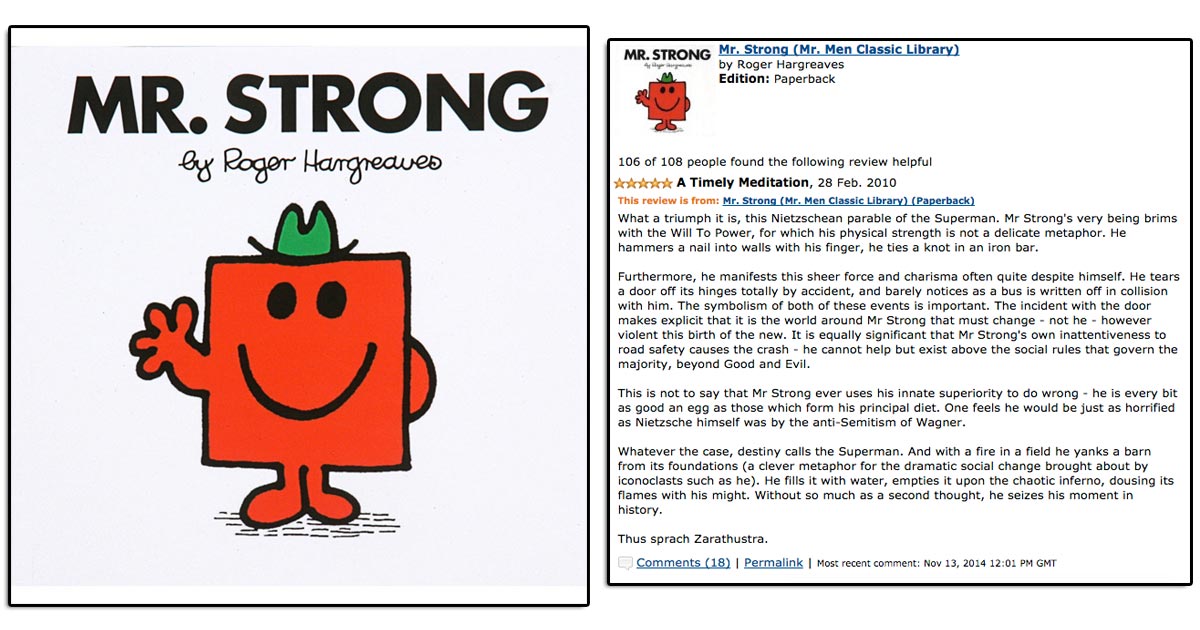These “literary criticism” Mr Men Amazon reviews will bring joy to weary parents
Mr. Strong

A Timely Meditation
What a triumph it is, this Nietzschean parable of the Superman. Mr Strong’s very being brims with the Will To Power, for which his physical strength is not a delicate metaphor. He hammers a nail into walls with his finger, he ties a knot in an iron bar.Furthermore, he manifests this sheer force and charisma often quite despite himself. He tears a door off its hinges totally by accident, and barely notices as a bus is written off in collision with him. The symbolism of both of these events is important. The incident with the door makes explicit that it is the world around Mr Strong that must change – not he – however violent this birth of the new. It is equally significant that Mr Strong’s own inattentiveness to road safety causes the crash – he cannot help but exist above the social rules that govern the majority, beyond Good and Evil.
This is not to say that Mr Strong ever uses his innate superiority to do wrong – he is every bit as good an egg as those which form his principal diet. One feels he would be just as horrified as Nietzsche himself was by the anti-Semitism of Wagner.
Whatever the case, destiny calls the Superman. And with a fire in a field he yanks a barn from its foundations (a clever metaphor for the dramatic social change brought about by iconoclasts such as he). He fills it with water, empties it upon the chaotic inferno, dousing its flames with his might. Without so much as a second thought, he seizes his moment in history.
Thus sprach Zarathustra.
Mr. Happy

A Young Person’s Guide to Individuation
In his third work, Mr Happy, Hargreaves takes us on a Jungian journey to the integrated self.The story starts by introducing us to the supposedly perfect life that our eponymous hero appears to live – the tranquilized bliss and counterfeit euphoria of Happyland. Yet what is it that leads Mr Happy to wander away from an existence that, if truly flawless, should suffice to satisfy and sustain him? Why this need to venture deep into the mysterious unknown of the forest? To open a door in a tree-trunk and descend a staircase beneath the ground to the deepest recesses of the unconscious?
Here lays the crux of this exploration of analytical psychology – the defining happiness of our central character is revealed as nothing more than a persona. His name and outward appearance are a mask to the outside world and from himself. It is the very inauthenticity of this state of affairs that drives him on the voyage to seek out and confront the root of the dissonance that this generates within him.
For indeed, what does he come face-to-face with at the foot of these stairs but his own repressed sadness? This comes in the form of his miserable alter ego – physically identical, polar opposite in mood. It is only through this confrontation with the shadow that his unsustainable persona can find authentic resolution and true integration of the self be achieved. These archetypes are quite literally brought to light as Mr Happy coaxes Mr Miserable up to the surface and into view of the conscious mind in a climax of now genuine peace and bliss.
In a knowing nod to his source material, Hargreaves depicts Mr Happy as round – a shape he shares with the mandala.
Mr. Small

Bleasdale Was Beaten To It
Mr Small is Hargreaves’ `Boys From The Blackstuff’. Here he adopts a more naturalistic style, putting aside explicit exposition of academic schools of thought along with his usual moral and philosophical preoccupations. In a manner that is almost kitchen sink, we follow the working class everyman – quite literally the small man – as he searches for a job in 70s Britain. Thematically Hargreaves shows his vision, as he presages the mass unemployment that was to come in the 1980s.Mr Small tries a succession of jobs for which he is woefully mismatched – they are all manifestly too big for him. He lacks the basic knowledge and skills to hold down any of the occupations he attempts. Does Hargreaves here break from his usual social conservatism with a damning indictment of an education system that is not adequately preparing the workforce for increasingly skilled and mechanized labour? And in this does he further express his frustration at how his own fictional potentialities have been manacled and constrained by this state of affairs?
For indeed, Hargreaves himself seems to give up on Mr Small – in a wry narrative flourish of course. Beneath the surface positivity of the ending, we at best encounter stoicism, with a definite undercurrent of fatalistic dread at what the very near future holds. The shadow of the impending Thatcher years is already falling across the world of the Mr Men. If Hargreaves has deprived him of revolutionary socialism in Mr Uppity – or even the more modest protection of the centre-left – there is nothing Mr Small can do but passively accept his situation. Mr Robertson, a literary personification of statutory intervention, is ultimately powerless to help him. The collective sentiment of the workers – embodied by a friendly postman – offers nothing practical, just sympathy. The only job that Mr Small proves fit to do is recount his story to the author. (Contrast this with the earlier Mr Bump, who successfully finds a job compatible with his idiosyncrasies as a character.)
Hargreaves, with characteristic genius, holds up his hands and laments his own impotence. But if Mr Small cannot be saved, at least he has been given a voice.
And well done YOU for reading all that. Now go an have a nice cup of tea or something – you deserve it
Source: http://www.amazon.co.uk/gp/cdp/member-reviews/A1SM813W6H36YA
